Filters
Product Categories

The Business of Sustainable Seafood: Maximizing Industry’s Return on Investment

Worker Voice in the US And Beyond: Strategies for Change in the Seafood Industry
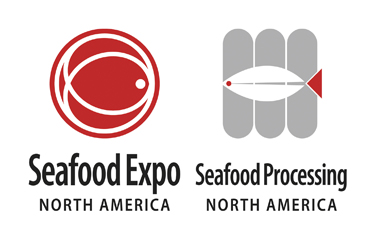
Access all available Seafood Expo North America 2024 conference session videos.
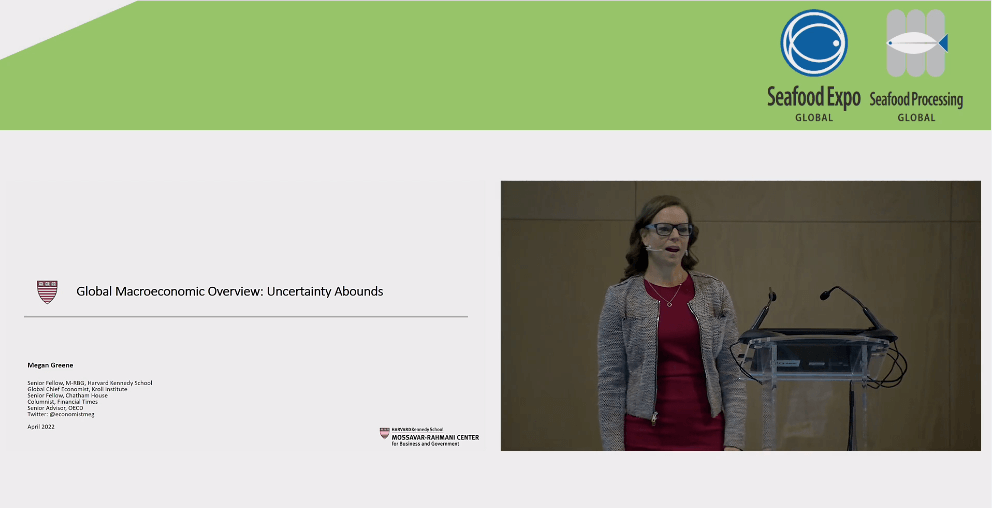
Speaker: Megan Greene, Harvard Kennedy School
Economic forecasting is a tricky business; they say the key to success is to forecast often. Megan Greene is unafraid to have out of consensus views and has a fantastic forecasting track record. She examines high frequency economic data, structural trends, global flows, political factors and policy developments to determine the state of the global recovery and to highlight risks and opportunities for businesses and markets. In this keynote presentation, Greene will examine these factors to offer insight on where the global recovery is heading, including an outlook for international supply chain challenges, inflation, and climate change.

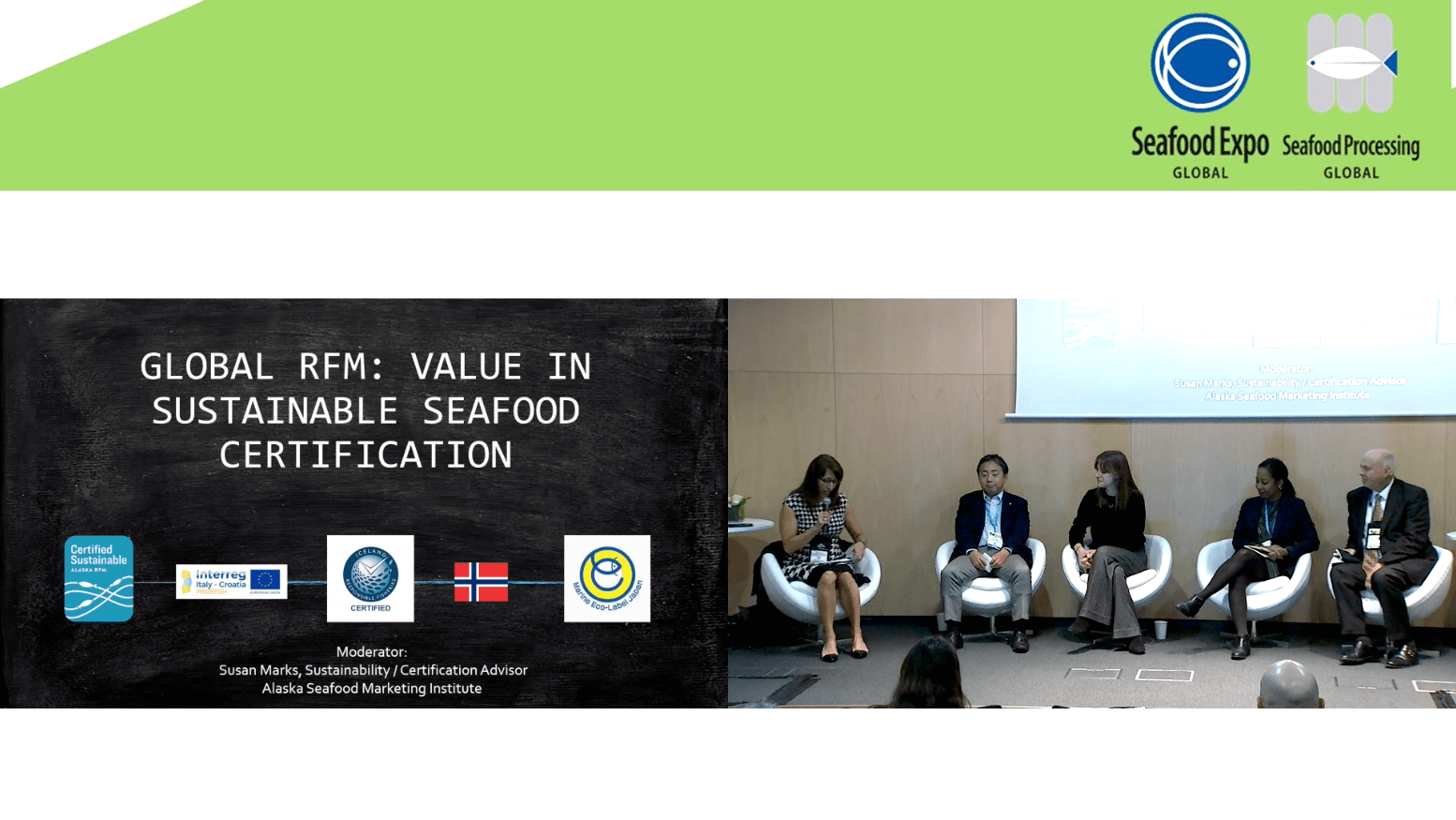
Speakers: Sévrine Bethy, Food Safety and Responsible Sourcing Manager - Group Supply Management - SODEXO, Hisa Kanno, Secretary General / Technical Manager - Marine Eco-Label Japan Council, Allen Kimball, International Fisheries Operations and Sales Consulting - Trident Seafoods, Giulia Sandalli, Postdoctoral research fellow - Institute for Marine Biological Resources and Biotechnology of the National Research Council (CNR-IRBIM), Sigrid Merino Sardá, Managing Director - Iceland Responsible Fisheries Foundation
The Responsible Fisheries Management (RFM) certification programs offer a way for markets to provide certified, sustainable seafood and highlight the origin without the added expense of logo-licensing fees. Research shows that origin is often a key motivator for seafood purchases and consumers continue to demand more transparency in knowing where their food comes from. (Datassentials; Edelman Trust Barometer 2021) Many certification programs do not include origin on their logos leaving consumers in the dark about where their sustainable seafood comes from. Our goal is to make certified sustainable and traceable wild-caught seafood accessible to all. RFM based programs in Alaska, Iceland, The Gulf States, and Japan have gained momentum in the last few years, with all four achieving recognition to the Global Sustainable Seafood Initiative (GSSI) global benchmark. These programs are accredited and rooted in the Food and Agriculture Organization (FAO) Code of Conduct for Responsible Fisheries and provide a way for well-managed fisheries to be recognized as sustainable. For the supply chain, RFM programs provide a credible and affordable certification choice for customers who want to:
• Demonstrate proof of sustainable seafood sourcing;
• Highlight the origin of their certified sustainable seafood via an ecolabel that is free to use;
• Lessen the cost burden for all participants in the supply chain.
This panel will discuss how the various RFM Programs in North America, Iceland, and Japan are working together towards a future vision for a global RFM program that will eventually represent 6,000,000+ metric tons of certified, sustainable wild-caught seafood and why this appeals to other countries that are interested in offering RFM certification for their fisheries.
We will hear from fisheries in the European Union who are currently considering development of their own RFM program and why they have decided now is the time to explore alternative certification programs. You will learn about the shared Chain of Custody Standard between Alaska and Iceland and how this model is serving as a blueprint for future collaborations between RFM programs that will benefit the marketplace. We will also hear from industry how using the RFM Program adds value and saves money. Finally, we will discuss the difference between the RFM model of certification and other programs that charge a fee to gain market access. How can these programs exist and not charge logo-licensing fees? It is possible and is the foundation these programs are committed to upholding.
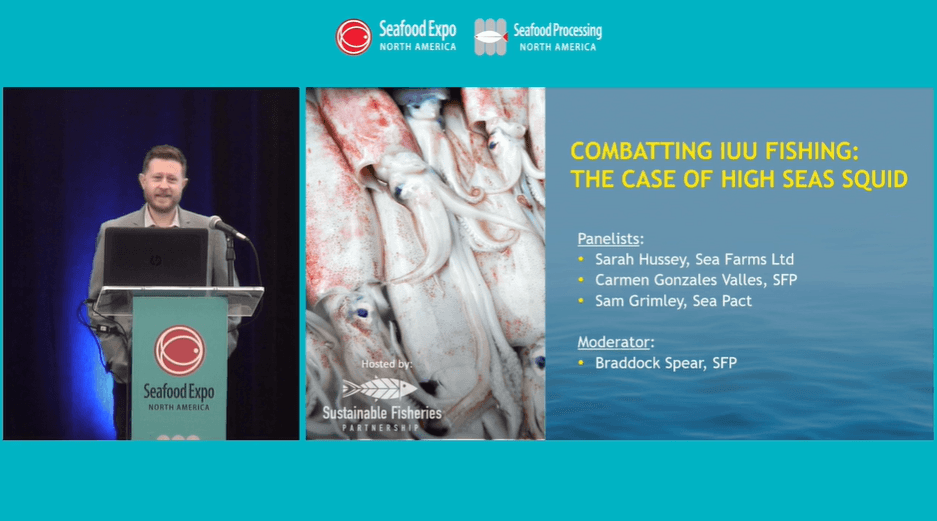
Moderator: Braddock Spear, SFP
Speakers: Sam Grimley, Sea Pact
Sarah Hussey, SeaFarms LTD
To combat each of the components of IUU fishing (illegal, unreported, and unregulated), different actions and multiple players are required. Governments need adopt laws, adhere to international agreements, set regulations, and enforce. Companies trading in seafood need to maintain ethical standards, support government actions to combat IUU, conduct due diligence of sources and suppliers, and impose consequences in response to illegal or unreported fishing activity. The high seas squid fisheries in the waters off the coast of South America presents a case study where governments and seafood companies are taking steps to stop IUU fishing. Our panel will provide three different industry perspectives on these issues in the fisheries and actions that have been, are being, and can be taken.
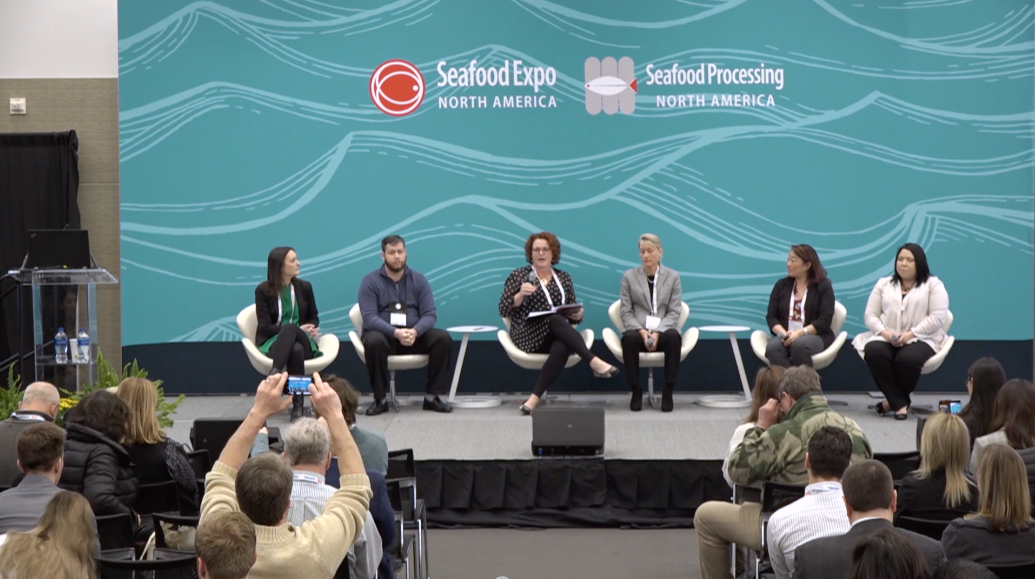
Speakers: Christine Burns Rudalevige, Coastal Culinary Academy; Abbie Curtis O’Reilly, GlobeScan; Brandon Hill, Sustainable Restaurant Group; Jennifer Lambert, Loblaw Companies Ltd.; Jan Tharp, Bumble Bee Seafoods; Shelley Zang, Kroger
A recent consumer survey found that 79 percent of American seafood consumers agree that fish must be protected for future generations. However, only 15 percent of American seafood consumers feel that retailers and large companies are effectively protecting the ocean environment. How can this gap be bridged? This session will attempt to better understand consumer behavior and the roles that brands, retailers, distributors, restaurants, and NGOs play in this important space. It will also unpack consumer decision-making at point of purchase, and the role the Marine Stewardship Council plays in purchase motivators. The panel will open with an overview of the survey results by Globescan, followed by input from industry leaders on how they are engaging with consumers and making them feel more confident in their purchases. Time will be dedicated to engaging the audience in a discussion about how to empower consumers in their purchasing decisions. The goal of this session is to gain an understanding of consumer purchasing motivators and market trends so that seafood brands, retailers, etc., can better inform their sustainability practices.






